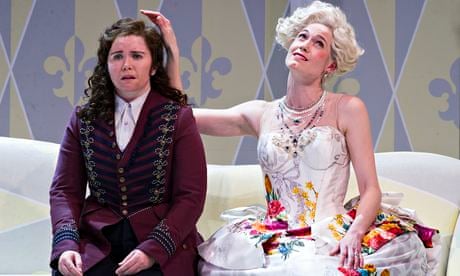Glyndebourne's opening night, always an excitable occasion, was almost too burdened with circumstance and emotion: a sunlit anniversary, a death, a new arrival and a new production. No one knew that another drama was in the offing, of which more in due course. Gus Christie came on stage to dedicate the 80th festival to his father, George, who died a fortnight ago. George's imagination and hard work over nearly four decades at the helm led to a spectacular new theatre and the advent of a more accessible and unstuffy modern Glyndebourne. The Sussex festival remains elitist, if that means top quality, but its doors are no longer padlocked to all but the well-heeled or well-connected. Try for yourself.
The newcomer was Robin Ticciati, 31, who has succeeded Vladimir Jurowski as music director. The new staging was Richard Jones's 1950s updating of Der Rosenkavalier. The question of how the intellectually barbed Jones would handle Richard Strauss's clotted rococo-romantic confection, written in 1910 but holding up a mirror to a Mozartian past, merely added to the febrile atmosphere.
All of which is a preamble to explain why the orchestral prelude went awry. I feared it was going to stop altogether. Strauss's score in these first bars is explosive: a yelping, whooping, sexually charged opening to remind us that the young Octavian has been honing his life skills in bed with an older married woman, the Marschallin, who must be all of 28. No one in the pit sounded quite ready. Imagine a kick serve landing while the opponent is still picking up the racket, for which read music, bow, instrument, glasses, tempo.
The first-class London Philharmonic, one or two skirmishes aside, soon achieved equilibrium. In Ticciati's interpretation, clarity and detail stood out over shape and trajectory, the orchestral tone never too fat or congested yet perhaps needing more aural glow. A typically dazzling Strauss invention is the hushed, fluttering grouping of celesta, harps, flutes and violins in the presentation of the rose scene, magically played here. Ticciati brought out the work's darkness, too, with its echoes of the composer's Elektra and Salome in the weird, growling low wind and fidgety brass.
Jones, together with his designers Paul Steinberg (set), Nicky Gillibrand (costume) and Mimi Jordan Sherin (lighting), has created a stylish, half-crazed hybrid: Wiener Werkstätte and art deco wallpapers, powdered wigs and pannier skirts stopping mid-calf, modernist Mies van der Rohe chair and conservative French salon painting (Alexandre Cabanel's Birth of Venus), whipped up with a touch of nicely acidulated filmic glamour.
It looked magnificent and witty, without hitting us with "concept", always a relief. The best addition was the toning down of Baron Ochs (Lars Woldt), who was younger and more rugger-bugger than tweedy old boor – and the more credible for it. Woldt, a native German speaker, had adopted a rough dialect, just as Hofmannsthal and Strauss wanted. The scene in which he is duped, usually so tedious, had tension and humour.
The large and energetic cast was bursting with lively cameos from the major domo flunky with the snivelling smile, to everyone's favourite tongue-twisting gossips, Annina and Valzacchi (Helene Schneiderman and Christopher Gillett). Michael Kraus, Miranda Keys, Gwynne Howell and Andrej Dunaev all made the most of their supporting roles. As ever with Jones, there were funny-walking, crisply choreographed extras, who added their own dimension to the class-riven tale, though who could say who they all were.
The three women who stamp their indelible mark on this music, culminating in a final trio which is one of those Desert Island Discs favourite choices, were at once contrasting and well matched. Kate Royal as the Marschallin is first seen not in bed with Octavian, but post-bed near-naked in the shower, alla Venus. Royal is restrained rather than voluptuous in the role, but she is poised, accurate and always a rewarding performer.
Both Teodora Gheorghiu (Sophie) and the 27-year old Irish star mezzo Tara Erraught (Octavian) had a blissful innocence about them, as fresh in appearance and voice as babes in the wood. Gheorghiu has a quick, brittle, naughty demeanour reminiscent of the young Natalie Dessay. Erraught was touching in the trouser role of young Octavian, every moment beautifully sung and acted, ardent and appealing. Her voice is rich with dark glints and bright promise and she offered some of the best singing of the evening.
Unwittingly she provoked a storm of comment which might have been avoided by the simple matter of a nicer wig and costume. The question of body mass index seemed to take undue prominence. She is petite and not remotely androgynous. I was untroubled by her casting and enjoyed her interpretation, but some commentators seemed to hope that a girl dressed as a boy should actually look like a boy dressed as a boy. The row escalated out of all proportion but put the whole question of how critics, male or female, talk about performers, male or female under scrutiny. We should all be vigilant.
Perhaps Strauss would have cast the role for a tenor if having to look authentic in trousers were the prime requirement. He probably hoped, instead, it would be sung wonderfully. Seeing a woman's curves through the boxy frock-coat and breeches the role requires, here with a skim of boot-polish on the chin to suggest downy growth, only adds to the sexual ambiguity of this most erotically complex of operas.

Comments (…)
Sign in or create your Guardian account to join the discussion